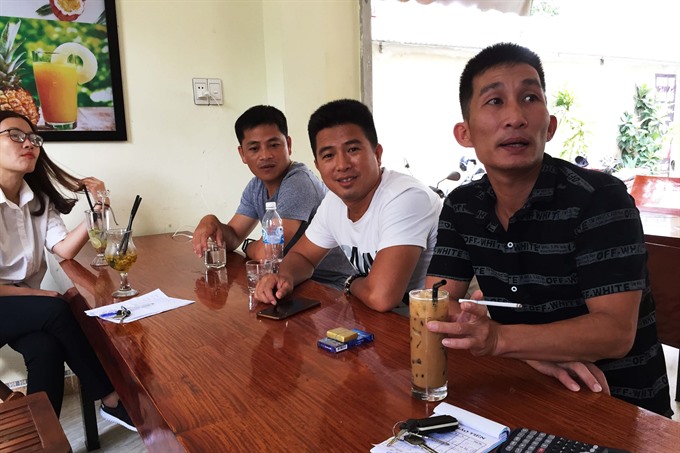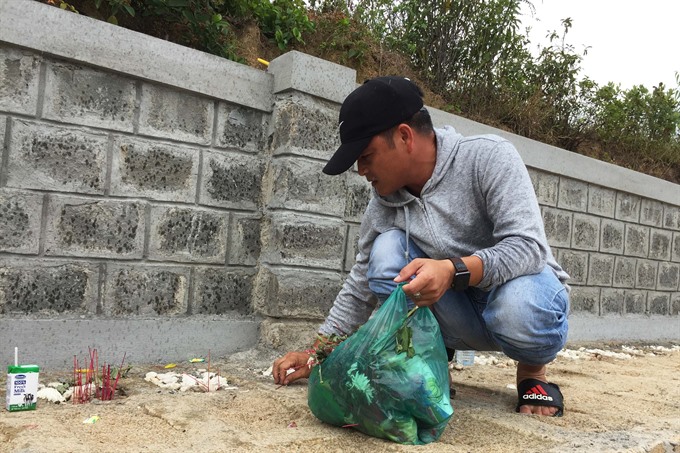 Society
Society

In the central province of Quảng Trị, three men work together to take care of the afterlife of aborted fetuses in the province.
 |
| Hạ, Chung, and Hạnh (right to left) discuss their job. — VNS Photo Phước Bửu |
Phước Bửu
QUẢNG TRỊ — In the central province of Quảng Trị, three men work together to take care of the afterlife of aborted fetuses in the province.
Hoàng Văn Hạ, one of the three, said that although the fetuses were not born, he and his friends considered them humans that need to be cared for in the afterlife. According to Vietnamese culture, this requires burials in graves and being memorialized by the lighting of incense.
Võ Hữu Hạnh, who formed the team, said he got the idea of collecting aborted fetuses and burying them in late 2017. He feels lucky as two of his closest friends, Hạ and Hoàng Chung, agreed to help.
“I feel pity for the aborted fetuses as once they were dumped as rubbish. I discovered that there are groups of Catholics in many localities around the country doing a similar job but none in Quảng Trị,” Hạnh said.
“I decided to construct a cemetery in this province for the aborted fetuses. I also thought of the benefits of the cemetery for parents of the fetuses.”
Abortion is legal in Việt Nam up to 22 weeks of pregnancy. The country’s abortion rate is among the highest in the world because contraceptive use is low due to poor sexual education.
Hạnh, Chung, and Hạ are neither Catholics nor Buddhists. Their belief in the humanity of fetuses comes from the traditional Vietnamese understanding that the time a person spends in the womb is significant – people date their age not from the time of birth but from the time of conception.
When Hạnh first started work on the cemetery, he could not imagine how hard it would be. He bought a hilly land plot in Ward 1 in Đông Hà Town, the municipal centre of Quảng Trị, but he could not build the proposed cemetery due to opposition from the nearby villagers.
Rural localities in the central region of Việt Nam do not have public cemeteries. Burials are done at uncultivated sandy, rocky and hilly land and typically only natives of the village are buried there.
Hạnh was not a native of the village where the land plot was located.
He then bought another land plot in another village in Ward 2, where Hạ is a native villager.
“Despite Hạ’s membership, I was cautious at first. I didn’t cut the trees and bushes around to hide the first abortion graves I built in January this year,” said Hạnh.
“Later I cut the trees gradually and observed the reactions from the villagers before starting major construction of the graveyard last month.”
Hạnh said difficulties in finding a site for the graveyard was not the only challenge he encountered in the job. To make contact with women who have had abortions, he hung a sign with his phone number and some information at the cemetery. Women call him to make appointments to meet at the side of the road or a secret location, as they may not want their doctors or family members to find out what they are doing.
“I am in charge of going to see the mothers to take the aborted foetuses for burials and I have faced suspicions from those mothers themselves.
“Some suspected that I took the fetuses for selling and others questioned whether I am a follower of a cult using prenatal humans for rituals. I convinced them successfully in the end but it was a waste of time and effort.”
 |
| Hạnh is collecting rubbish at the abortion cemetery. — VNS Photo Phước Bửu |
In Việt Nam, when pregnant women experience a miscarriage or stillbirth, they usually bury the fetus in their home cemeteries. Women who get medical abortions usually leave the fetuses at the clinic facility as waste. Hạnh focuses on providing services for women who have had medical abortions, but is also happy to conduct burials for miscarried or stillborn fetuses.
Hạnh said sometimes he went alone to collect the abortions and sometimes he did with Hạ or Chung together on his Huyndai Tucson to ensure safety, especially when they travel late at night to isolated areas.
Hạnh, 39; Chung, 37; and Hạ, 35 are all traders in Đông Hà Town. Each has a private shop and they have enough spare time for the job thanks to the good management of their businesses.
Hạnh said he was truly lucky to have support from two of his best friends. “The wise Hạ helps a lot in negotiation and planning while the muscular Chung is good for hard jobs and guarding us.”
However, Hạnh said his greatest luck at the job has come from the support of his wife. “I had VNĐ50 million reserved for my private needs, separate from my family budget. But the land purchase and graveyard construction costs so far are almost six times more than the amount I had.”
“My wife gave me the rest. I’m happy that she gives me sympathy, time, and money at the same time.”
“I have to ask a doctor to inject protein liquid to help me healthy. It was so hard these days, as the cemetery construction was going on while I took many calls for collecting aborted fetuses. My wife is always beside me, reminding me to take care of my health.”
Hạnh, Chung, and Hạ each have a happy family. Hạnh and Hạ each have three children while Chung has one son. Chung and Hạ’s wives also support their efforts on the cemetery for aborted fetuses.
Hạ estimated that their 300sq.m cemetery, with one tenth of the area already used for burials, will accommodate around 1,000 tiny graves and they will need more land in the future. Hạnh is seeking other land plots to purchase.
The burial is free of charge and Hạnh never gets funds from the families. However, he has plans to accept donations from generous donors nationwide.
“We determined that this is the job until our last breath in life so we have plans for expansion,” said Chung. According to Hạ, each fetus is buried in one grave after being put in a small pottery pot.
“We reserve one pot and one grave for each fetus and mark the date on the pot, in case the families want to take back the fetuses to bury at their own cemetery some day,” said Hạ. — VNS